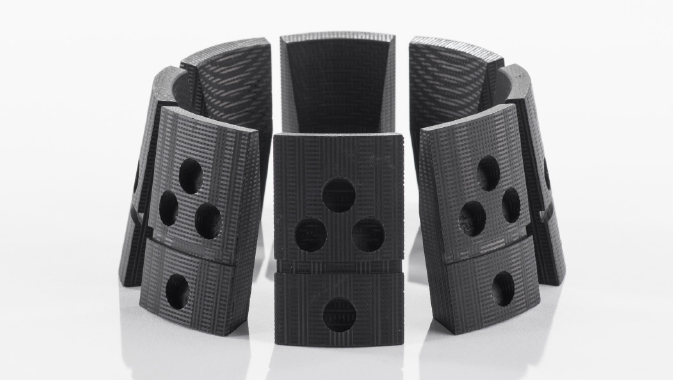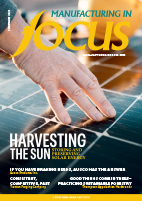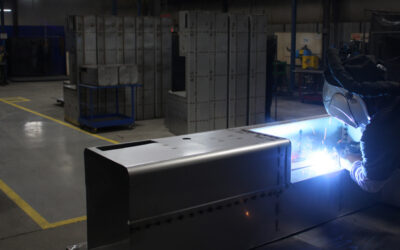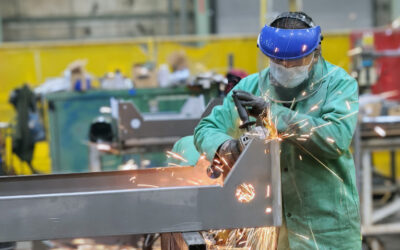As a material solution company, Fiber Materials, Inc. (FMI) serves the space, defense, aerospace, armaments, oil and gas, prosthetics, racing and luxury automobiles, submersibles and sporting goods sectors.
~
FMI designs and manufactures high-temperature materials and carbon fiber composites that have been used in everything from heat shields on robotic space capsules to the tips of defense missiles. The company is based in Biddeford, Maine, but its innovative materials and composites are currently being used in a spacecraft that is supposed to go to Mars and back with a human crew.
“Most of the work we’ve done and do is in defense and space. We do many of the thermal protection systems for NASA space vehicles for the protection of the vehicle as it re-enters the atmosphere,” states Dan Godbout, director of global sales and marketing.
FMI has worked with NASA for decades and been involved with some of that agency’s most prominent projects. These include the heat shield used on the Stardust mission, in which a robotic probe was launched into outer-space in 1999 to gather comet particles. The probe traveled three billion miles on its mission, returning to earth in 2006. While the actual Stardust capsule is now on display at the Smithsonian Institution’s National Air and Space Museum in Washington D.C., a replica of the heat shield can be seen at FMI’s offices.
The Stardust heat shield had to live up to some very tough specifications, protecting the robotic capsule from temperatures that hit thousands of degrees Fahrenheit in brutal cosmic conditions. NASA has contracted FMI to carry out several other major projects as well.
“We built the heat shield for the Mars Rover that went on Mars in 2012. We’re currently building a heat shield that will be put a larger Rover to go to Mars in 2020,” says Godbout.
In addition to work on the Mars Rover, FMI has contributed to the Orion spacecraft, which is designed to take actual human astronauts – not just robotic probes – close to Mars then back at some point in the near future. Fiber Materials has also crafted nose tips for U.S. Navy missiles.
For such projects, FMI uses carbon-carbon, defined as ‘a unique composite material consisting of carbon fibers embedded in a carbonaceous matrix,’ by Materials & Design magazine. It also employs polymer matrix composites (PMC), phenolic impregnated carbon ablator (PICA), ceramic matrix composites, its trademarked HHN Adhesive and more.
These materials are perfect for “any application that requires light-weighting,” says Godbout. ‘Light-weighting’ refers to making products and components from composite materials that are as strong as traditional metals but weigh significantly less.
While proud of its heritage in defense and space, FMI wants to diversify its markets. “We’re parlaying our success [in defense and space] over the last fifty years into high-performance racing and exotic automobiles, [and enhancing] growth in the commercial aerospace and industrial markets like petrochemical, armaments and oil and gas,” he explains.
Among other new ventures, FMI has branched into tooling for oil and gas companies doing fracking work. FMI uses a polymer matrix composite for tooling purposes. “It’s a lightweight material that has two times the strength-to-weight ratio as titanium,” says Godbout.
Fiber Materials has also been doing some prototype work in the field of prosthetic limbs. FMI also uses PMCs for prosthetic prototyping.
While the company utilizes proprietary designs, FMI often works closely with clients to develop new materials and composites. “In some instances, it’s a collaborative effort,” states Godbout. “The materials science will be jointly owned by us and our customer.”
FMI currently operates two facilities in Biddeford. The primary facility houses the engineering, production and machining departments. The other is a secure plant where work for defense-related or otherwise classified programs takes place. FMI has its own machine shop, with “traditional lathes and CNC (computer numerical control) machines,” says Godbout, adding “We’re looking to [acquire] newer equipment to get more advanced machine capabilities.”
Fiber Materials, Inc. was founded in Westford, Massachusetts in 1969 by one Walter Lockman. He moved the firm to Biddeford, Maine in the early 1970s “in an effort to find skilled laborers to do the weaving of composite carbon fiber preforms, because southern Maine was a big textile area,” continues Godbout. At one point, Fiber Materials had production facilities in Scotland and northern Maine, “but that wasn’t really part of our core, so they dissolved those entities and stuck with our core business,” he adds.
In 2011, the firm was sold to GrafTech International and became part of a publicly-traded company in the process. FMI existed as a division of GrafTech until late 2016, when it was purchased by Edgewater Capital Partners. Godbout says the current ownership arrangement with Edgewater works very well.
Godbout attributes the company’s longevity to the excellence of its products and staff and the fact many of the projects it undertakes have very long shelf lives. Some defense-related initiatives with which FMI is involved, such as the Trident submarine missile program, are slated to last for decades.
“We’re working on new programs for hypersonic vehicles and weapons, as well as programs for advanced interceptor type missiles,” and these will also likely have lengthy lifespans.
At present, FMI has 170 workers, up from 155 last year at this time. “We have a very strong engineering staff. The application engineering team consists of PhD level chemists, electrical and mechanical engineers on board,” he says.
The company’s biggest challenge at present is in attracting sufficient numbers of workers for its operations. Unemployment is low in Maine, which ironically can be problematic for growing firms such as Fiber Materials that need new employees.
“We want people who are proud to work for a company that supports the defense of the United States of America, but most importantly, we want people who are dedicated, safety-conscious individuals who don’t mind hard work,” says Godbout.
Safety consciousness, it should be stressed, is paramount at Fiber Materials. “Safety is a huge part of our culture here. We have an environmental health and safety management program with a leader that manages safety programs. We take employees from around the company and do safety walks. We pick an area in manufacturing, and do a safety inspection of the area. We look for things that we can find and fix immediately, make recommendations for improving safety,” states Godbout. “We report our metrics – how many days without injury or lost time at work – and we share all those metrics with employees.”
The safety walks involve plant-floor employees and senior management alike. “We’re also very focused on having a lean environment and do what we call 5S walks. The 5S walks directly impact safety by looking at where we can go in and clean up an area and make it more efficient,” continues Godbout. The 5S is a Japanese manufacturing methodology, and the five S’s in question are sort, set in order, shine, standardize and sustain.
Fiber is ISO 9001:2008 certified and fanatic about quality control, for a good reason. Given FMI’s clientele, a product failure might be disastrous.
“We have a full quality department, and it’s a big part of our business, because if you think of all the applications we support, they have to work one hundred percent of the time. There’s no, ‘oh, that missile didn’t make it to its target’ or ‘that heat shield didn’t work on the re-entry of a multi-million dollar vehicle coming through the atmosphere.’ We have audits done on us routinely by our customers. Our quality inspection and quality processes and documentation is quite significant. We make sure we’re following all ISO specifications and requirements for quality activities,” states Godbout.
Over the years, Fiber has won a slew of awards. Last year, for example, the company picked up the Smaller Business Association of New England (SBANE) Innovation Award. This honor recognized a new PMC that FMI recently introduced.
As for promotion, Fiber Materials hosts a website and does social media and targeted trade shows. To this end, Fiber was part of a delegation from Maine at the JEC World international composites show in Paris, in March 2017.
“In our core business, we spend a lot of time engaging with [organizations] such as the missile defense agency, Department of Defense, navy, air force, even the Congressional side of things, to see what programs are coming in the future. What are the trends in defense and space areas and what we can do to support them? For new markets, we target specific applications where we think we can provide solutions and come up with marketing material from a digital standpoint and networking standpoint at trade shows,” says Godbout.
As for the future, he says, “Five years down the road, I see us with a diverse business and nearly doubling our revenue. [We’ll be] growing the size of the business both in the core [of defense and space] and in new markets with the expansion of new applications.”













